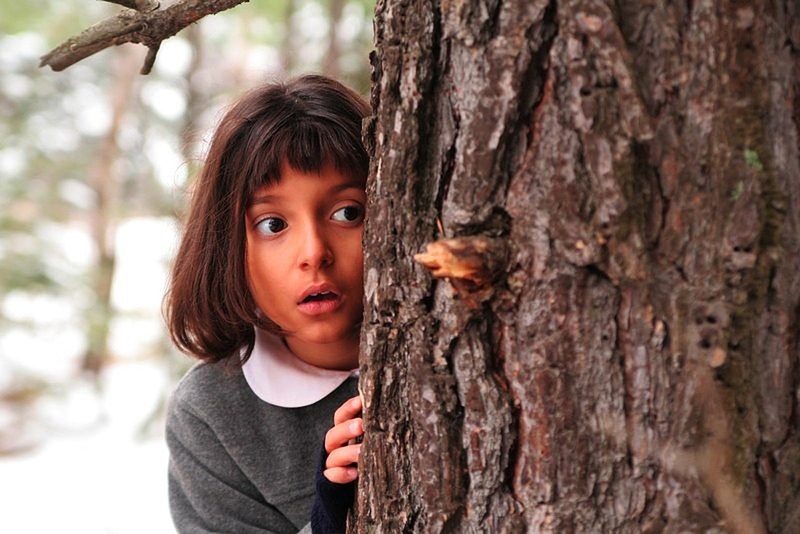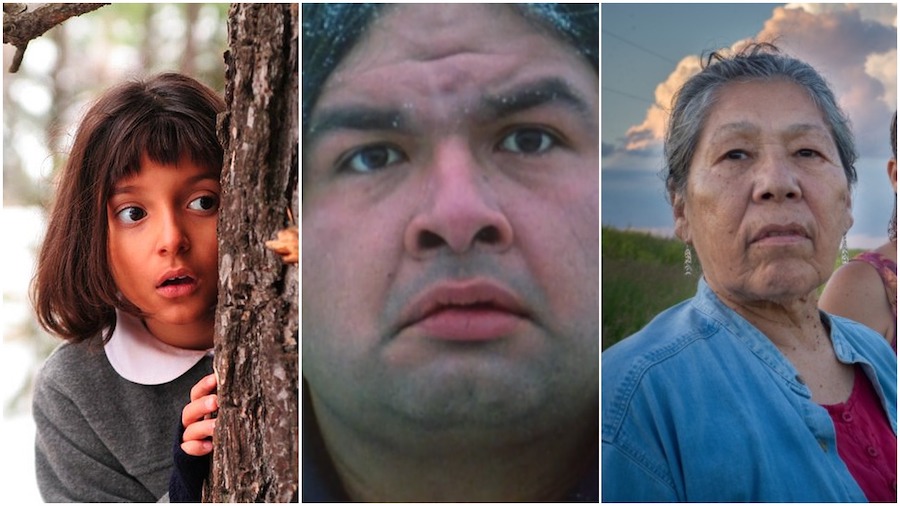What movies should you watch for Indigenous Peoples’ Day? Inspired by last year’s PBS mini series, the four-part documentary “Native America,” I asked the experts, from the first Native American actor to receive an Academy Award to the first Native American to earn a Pulitzer Prize to a first-time feature filmmaker, local activists and the Smithsonian.

QUEEN MUHAMMAD ALI
The Watts-born Queen Melé Le’iato Tuiasosopo Muhammad Ali is American Samoan on her mother’s side and African American on her father’s. As the founder of Nation19 magazine and director Manuia Samoa. Queen Muhammad Ali and Hakeem Khaaliq directed a short documentary, “Bars4Justice” (2015), about the shooting of Michael Brown in Ferguson.
“Even the Rain” or “También la lluvia” (2010): Directed by Icíar Bollaín Pérez-Mínguez
“The Orator” (2011): Written and directed by Tusi Tamasese (Samoan New Zealander)
“Sweet Country” (2017): Directed by Warwick Thorton (Kaytej, indigenous Australian)

CYNTHIA BENITEZ
Cynthia Benitez is a film curator and scholar specializing in Native and indigenous film. She is currently the Film Programmer for the Smithsonian National Museum of the American Indian in New York City. Her list is so extensive, it deserved separate post, but here are the highlights:
DOCUMENTARY
“Kanehsatake: 270 Years of Resistance” (1993)
“Warrior Women” (2018)
“Miss Navajo” (2007)
“Columbus Day Legacy” (2011)
FICTION
“Atanarjuat, The Fast Runner” (2001)
“Four Sheets to the Wind” (2007)

N. SCOTT MOMADAY
When asked about his Pulitzer (in 1968 for the novel about a World War II veteran, “House Made of Dawn”), Kiowa novelist and poet Momaday was surprised–he didn’t even know that he had been nominated and noted that the prize “brought me lots of junk mail” and “invitations to speak at numerous garden clubs and so on,” but it also “assured my publishing career.” That’s something considering he was in academia, a “publish or perish” world, and, on a more serious note added, “I was delighted, of course, that I’m credited with beginning the Native American Renaissance.”
“Hostiles” (2017): Directed by Scott Cooper
“A Man Called Horse” (1970): Directed by Elliot Silverstein
Honorable mention to “Dances with Wolves“
As a writer, he’s recommend the books: 1929’s Laughing Boy (a book that earned Oliver La Farge a Pulitzer Prize and which was made into a 1934 movie) and 1970’s Bury My Heart at Wounded Knee by Dee Brown.

MARY KATHRYN NAGLE: Cherokee Nation
Mary Kathryn Nagle is the executive director of Yale Indigenous Performing Arts Program and a partner at Pipestem Law, a firm specializing in tribal sovereignty of Native nations and peoples. She is also a playwright. Nagle was introduced to me by Wes Studi who was doing a reading of her play, “Sovereignty” that weekend. Nagle is a Board Member of Vision Maker Media which helped provide funding for films like “Rumble: The Indians Who Rocked the World.” Vision Maker has a Film Festival in April of next year in Lincoln, Nebraska.
Two of her plays that she feels would make a great movie would be “Sovereignty,” the story of a Cherokee lawyer who returns to Oklahoma to restore her Nation’s tribal jurisdiction, and “My Father’s Bones” which tells the true story about Olympic gold medalist Jim Thorpe’s children who cannot claim their father’s bones because they were sold by this third wife and are owned by a city in Pennsylvania.
“Powwow Highway” (1989)
“Smoke Signals” (1998)
“We Shall Remain” (2009): A five-part PBS documentary that was part of the American Experience series
Nagle recommended films by Sterlin Harjo (Seminole-Muscogee)
CORINNE OESTREICH
Corinne Oestrich is a professional journalist with Powwows.com and an ambassador for the internet campaign #phenomenalwoman and #phenomenallyindigenous. She is a founder of the non-profit program that aims to reduce human trafficking and violence against women through empowering men to embrace heathy emotional behavior linked to indigenous values: “The Buffalo Project.”
Three stories she wished would become a movie: Wounded Knee Incident of 1973, the Occupation of Alcatraz and one wild story about a Native American who served overseas, kept his hair long and wore moccasins to walk into an enemy encampment. Hollywood are you listening?
“Awake, a Dream from Standing Rock” (2017): Directed by Josh Fox, Myron Dewey, James Spine
“Smoke Signals” (1998): Directed by Chris Eyre (Cheyenne and Arapaho); Written by Sherman Alexie (Coeur d’Alene)
“Wind River” (2017): Written and Directed by Taylor Sheridan

JEFFREY PALMER
Kiowa filmmaker Jeffrey Palmer was at Sundance Film Festival with his nine-minute short, “Isabelle’s Garden,” when opportunity knocked. Shirley Sneve of Vision Maker Media saw his short and got together with American Masters’ producer, Michael Kantor. Although, Sneve and Kantor discussed other people, Palmer relates, “because I was Kiowa” and a “kindred spirit,” he got the gig to direct the American Masters episode: “N. Scott Momaday: Words from a Bear.”
Although American Masters has a set format, Palmer spoke with Kantor because he wanted to push the boundaries of their storytelling format. Working on a feature-length documentary and having to meet a certain standard was “one of the most challenging things I’ve ever done in my life,” he recalled. “I realized how much a village it takes to make a film” and the importance of having “those types of relationships” with the production crew.
One of the problems was finding a balance between Momaday’s poetry and his life story. While in a previous phone interview Momaday expressed satisfaction with the end result, Palmer wished he could have had more of a conversation between Momaday and Robert Redford and although James Earl Jones pops up, there wasn’t room to include a reading of Momaday’s work that featured Jones and Momaday. “The two of them have a special connection; it’s like a conversation between God and a Bear.” Palmer considers them “probably the two greatest orators, the two greatest voices” of our times. That reading will make it on to the DVD as one of the extras.
Palmer’s choices are:
“Atanarjuat: The Fast Runner” (2001): Directed by Zacharias Kunuk (Inuk). The first Canadian dramatic feature film produced entirely in Inuktitut.
“Barking Water” (2009): Written and Directed by Sterlin Harjo (Seminole-Muscogee).
“Boy” (2012): Written and Directed by Taika Waititi (Maori and Russian Jewish and Irish)
“Frozen River” (2008): Written and Directed by Courtney Hunt
“Imagining Indians” (1992): Written and Directed by Victor Masayesva Jr.
“Powwow Highway” (1989): Directed by Jonathan Wacks
“Sami Blood” (2016): Written and Directed by Amanda Kernell (Sámi)
“Songs My Brothers Taught Me” (2015): Written and Directed by Chloé Zhou
“Smoke Signals” (1998): Directed by Chris Eyre (Cheyenne and Arapaho); Written by Sherman Alexie (Coeur d’Alene)
“Trudell” (2005): Directed by Heather Rae. John Trudell (1946-2015) was Santee Sioux (father) and Mexican-Native American (mother). He was the National Chairman of the American Indian Movement. His wife, mother-in-law and kids died in a suspicious fire in Nevada.

WES STUDI
In June of this year it was announced that the Academy Awards Board of Governors would present Wes Studi with an Honorary Oscar at the 11th Annual governors Awards on October 27, 2019. Studi is the first Native American to receive an acting Oscar. Born and raised in Oklahoma, Studi began acting with the American Indian Theater Company and his first film role was in the 1989 indie feature “Powwow Highway.” That role led to him being cast in the 1990 “Dances with Wolves.”
Studi especially appreciates films where Native Americans are portrayed as ordinary people within the mainstream society such as “Heat.”
“Dances with Wolves” (1990): Directed by Kevin Costner
“Edge of America” (2003): Directed by Chris Eyre
“Heat” (1995)
“Little Big Man” (1970): Directed by Arthur Penn. Especially for Chief Dan George (Tsleil-Waututh Nation)
“Older Than America” (2008): Directed by Georgina Lightning (Samson Cree Nation)
“One Flew Over the Cuckoo's Nest” (1975): Directed by Miloš Forma. For Will Sampson’s (Muscogee Creek) portrayal of Chief Bromden
“The Outlaw Josey Wales” (1976): Directed by Clint Eastwood. Again, for Chief Dan George
“The Only Good Indian” (2009)
“Smoke Signals” (1998)
“Street Fighter” (1994)












